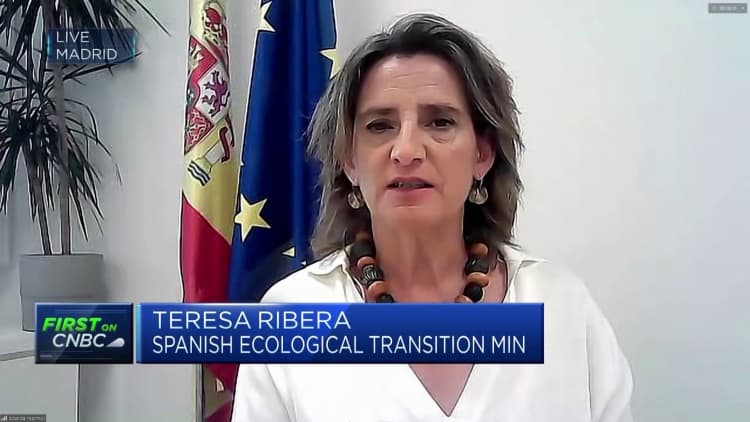SEVILLE, Spain — The day-to-day reality of scorching summer heat in Spain is taking its toll.
A spate of heat waves stretching across southern Europe has pushed temperatures in parts of Spain, Greece, Italy and Albania to record levels in recent weeks. Researchers say the climate emergency is strongly increasing both the likelihood and intensity of the extreme weather conditions.
The mercury in the southern Spanish city of Seville hit 40 degrees Celsius (104 Fahrenheit) on July 20, shortly before national elections failed to produce a clear winner.
On that day, a line of tourists stood in a queue waiting to enter the Royal Alcázar Palace, with lukewarm water bottles clenched in their hands. The stones of the largest Gothic cathedral in the world were hot to the touch.
"The heat is relentless. I feel like the summers are hotter and longer than they used to be," Carlo Núñez, a 41-year-old born and bred Sevillian who works as a taxi driver, told CNBC.
Elsewhere, a tourist slowly fanned herself as she chatted to her party while sat in the shade of a tapas bar in Plaza del Triunfo.
The fans are a staple in Andalusia, the most populous region of Spain, a place of torrid summers and "Moorish" architectural heritage due to seven centuries of Islamic rule from 711 to 1492.
Maria Sánchez, 39, works in a hand-made fans shop in downtown Seville. "During the day I work here where I have air conditioning but the walk home is ... agony," Sánchez told CNBC.
"At night I have difficulty sleeping because of the heat which makes me tired all day long," she added.
'The skin has memory'
Water scarcity and the sweltering heat continue to be contentious issues in Spain, especially in Andalusia.
Tacho Rufino, economist at the University of Seville, told CNBC that when classes are not in session, he lives in Cádiz in the southwest. "I had to make the move as Cadiz is on the sea and it's 10 degrees [Celsius] cooler."
Rufino said he suffered from skin cancer, which his doctor informed him was due to excessive sun exposure. "The skin has memory, and it's not adjusting fast enough to the sun rays, which are getting harsher."

Spain's general election, called six months earlier than necessary by Prime Minister Pedro Sánchez, resulted in an inconclusive vote. Led by Alberto Núñez Feijóo, the right-wing People's Party secured the most votes on Sunday but ultimately fell short of a parliamentary majority.
The ballot was the first time Spanish elections had been held so late in the summer, a move that was heavily criticized. Still, voter turnout was more than 70%, a higher level than in 2019 when 66.23% of the population voted.
The election result will likely kickstart several weeks of negotiating as rival political parties explore their options.
A fierce battle
Blistering heat is not new to Spain, a drought-stricken country that has been suffering from raging wildfires in recent weeks.
Indeed, it is against this backdrop that Andalusia has been at the heart of a fierce battle over the Doñana National Park, which is home to one of Europe's largest wetlands and is designated as a World Heritage Site by the United Nations cultural agency.
The Andalusian regional government, led by the PP, proposed to expand agricultural irrigation to help local farmers battling water scarcity.
Meanwhile, the European Commission and the central government of Spain opposed the move as the natural reserve state has been deteriorating at an alarming rate over the last 10 years due to excessive exploitation and intensive farming.
A report from environmental campaign group Greenpeace published earlier this month highlights how Spain's agricultural sector is heavily dependent on natural resources — particularly land and water, both of which are under increasing pressure from changes to the climate.
The economic impact of the recurring heat waves in Spain will be felt well after summer ends.
"The current drought will limit Spaniards' power purchase this winter, especially in the olive oil sector," Rufino said.
Spain exported $230 million of olive oil in 2021, according to the Observatory of Economic Complexity, making it the world's largest exporter of the commodity.
Olive oil prices soared further into record-breaking territory this month and analysts have told CNBC that high prices could be here "for some time to come."

Tourism in Spain, however, appears to remain robust. Data from the European Travel Commission, a nonprofit based in Brussels, showed earlier this month that Spain was the most popular destination among travelers planning to take trips between June and November this year.
However, the ETC data suggested that the extreme heat across southern Europe could accelerate a burgeoning trend among holidaymakers, as more tourists prioritize milder temperatures or off-season travel to avoid spending their time away in oppressive heat.
"I haven't noticed a decrease in tourists coming," Sánchez said. "They are the only ones out in the middle of the day, even when it's really hot, in July or August."
In Madrid, a group of Scots could be seen drinking beer in the midday sun outside a four-star hotel before leaving that evening.
"Back home it's grey and it's raining, I'd rather be here" one of them said.

